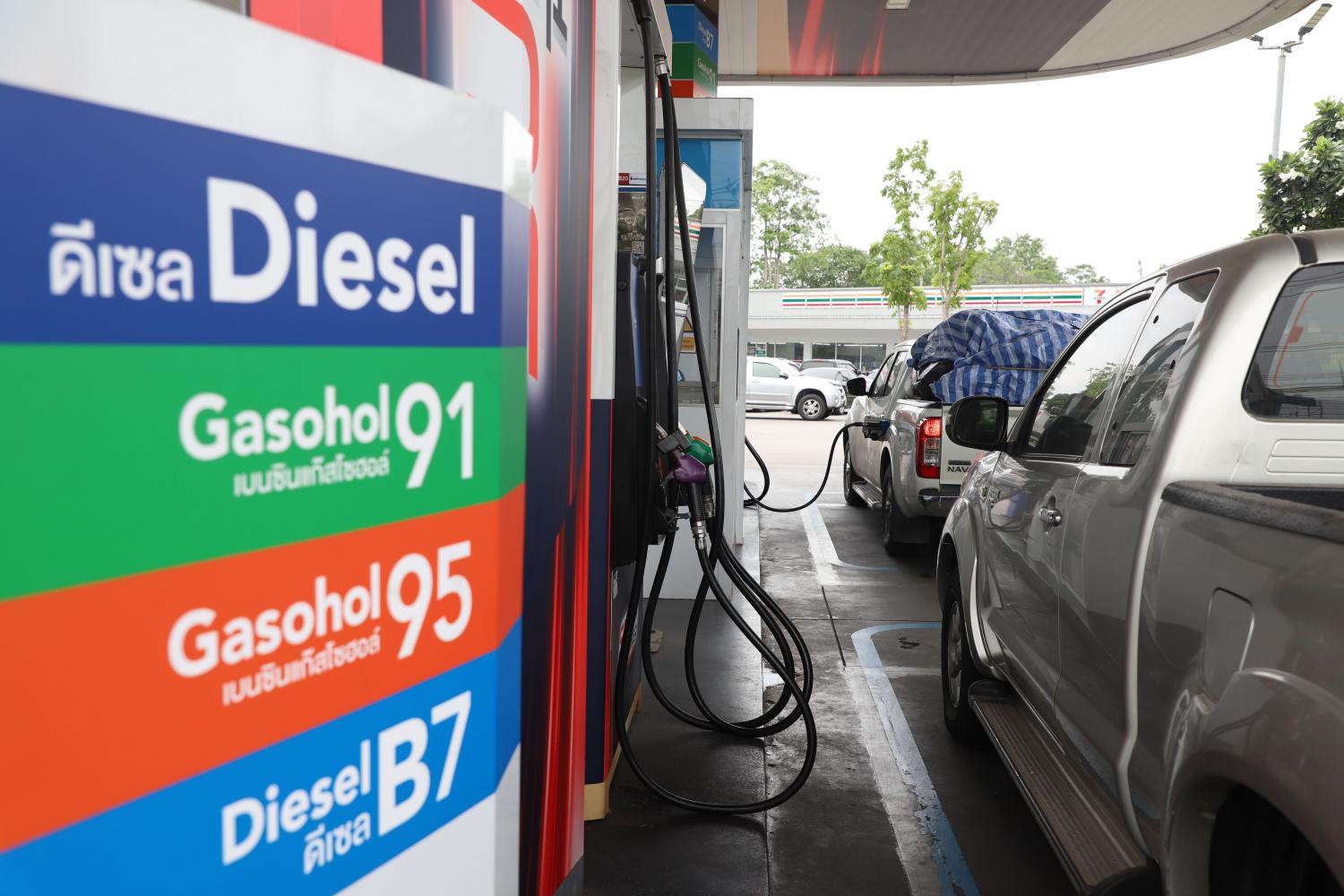
Diesel prices dipped again on Monday to around 32 baht a litre as global crude oil prices are on a decline.
The decrease happened as economists are concerned about a global economic recession. The Explainer looks into the relationship between oil prices and a sluggish economy to determine whether this trend will continue through 2023.
Why have crude oil prices dropped?
The Oil Fuel Fund Office (Offo) attributed the decrease to an economic contraction as a result of central banks' interest rate hikes.
Wisak Watanasap, director of the Offo, said before the announcement of a new domestic diesel price last week, global oil prices were expected to fall slightly if interest rates continue to rise.
Economists expect central banks, led by the Federal Reserve and the European Central Bank (ECB), to keep increasing interest rates, which will cause a slight drop in fuel consumption, he said.
The World Bank said last year central banks' decisions to raise interest rates in response to high inflation could lead to a global recession in 2023, during which economic activities turn tepid.
Earlier this month, the Fed decided to raise its benchmark interest rate by another 0.25 percentage points, the 10th consecutive uptick over the past 14 months, according to media reports.
The benchmark rate went up to a range of 5% to 5.25%, the highest in 16 years.
The move increases borrowing costs for consumers buying goods via credit cards and makes business loans more expensive.
The ECB also resolved to raise its three key interest rates on refinancing operations, the marginal lending facility and the deposit facility by 0.25 percentage points to 3.75%, 4.00% and 3.25% respectively, scheduled to take effect from May 10.
In Thailand, local economists believe the Bank of Thailand will increase its policy rate to a terminal level of 2% this month after estimating the fed funds rate in the US already peaked.
According to ttb analytics, the research centre of TMBThanachart Bank, the central bank's Monetary Policy Committee is expected to increase the policy benchmark rate by 0.25 percentage points at its next meeting on May 31 from the current rate of 1.75%.
The rising interest rates should indirectly decrease global oil prices, relieving the financial burden on the state Oil Fuel Fund, said Mr Wisak.
The fund has been in the red after several billion baht was spent to subsidise domestic diesel prices last year when the impact of the Russia-Ukraine war drove up energy prices.

A worker fills petrol in a car at a Bangchak station. Demand for petrol is expected to grow by 1.8% in 2023, said Mr Nitipat. (Photo: Somchai Poomlard)
Will crude oil prices continue to decrease?
If there are no unexpected incidents caused by major oil-producing countries or geopolitical conflicts, the prices are expected to keep falling, according to the Offo.
Dubai crude oil reference prices decreased from US$91.13 per barrel in October last year to $78.5 per barrel on average in March.
Offo's view is similar to an earlier prediction by analysts of national oil and gas conglomerate PTT Plc.
Global crude oil prices are expected to keep decreasing to US$85-95 a barrel on average this year as the world economy slows down.
Oil supply would slightly exceed demand this year, but global oil prices will still fluctuate and could go up at any time if supply is disrupted, said Nitipat Saengdaochai of PTT Prism during the 11th annual petroleum outlook forum.
PTT Prism is a unit under PTT Group comprised of experts across PTT energy businesses.
Demand for oil is expected to grow by 1.8% in 2023, said Mr Nitipat.
Economic activities play a key role in driving the demand.
According to the "World Economic Outlook" unveiled by the International Monetary Fund (IMF) in April, global GDP is projected to fall from 3.4% in 2022 to 2.8% this year, before settling at 3% in 2024.
"Advanced economies are expected to see an especially pronounced growth slowdown, from 2.7% in 2022 to 1.3% in 2023," said the IMF.
In Thailand, GDP is expected to grow by 3-3.5% this year, while inflation will hover in a range of 2.7-3.2%, the Joint Standing Committee on Commerce, Industry and Banking (JSCCIB) said last month, maintaining its key economic indicator forecast.
The domestic economy is on a path of recovery, driven by growing tourism, though exports have slowed since late last year, said the committee.
Thai exports are projected to contract by 1% or remain flat this year, based on the prospect of a global recession, according to the JSCCIB.
Thai energy conglomerate Bangchak Group is monitoring the economy both domestically and globally as this can affect energy prices.
The company is watching energy prices in the second quarter this year amid worries about a global recession.
Crude oil prices are expected to continue to face pressure because of concerns that the global economy is heading for a recession, particularly in Europe, Chaiwat Kovavisarach, group chief executive and president of Bangchak Plc, said last week.
But despite the sluggish economic prospects, the crude oil price has been driven by growing supply tightness concerns after Opec and its allies decided to cut oil production, he said.
How much fuel does Thailand use?
In the first quarter of this year, overall consumption of fuels increased to a level greater than in 2019, followed by a decline for two years during the pandemic slowdown, according to the Department of Energy Business.
From January to March 2023, fuel demand rose by 5.65% to 161 million litres per day (MLD) on average, up from 151 MLD in the first quarter of last year.
Consumption of diesel rose by 0.2% year-on-year to 76.4 MLD, up slightly from 76.2 MLD.
Diesel was sold at around 32 baht a litre starting on Monday. This marked the sixth in a series of reductions of diesel prices since early February, when the retail price in Thailand was 34.94 baht a litre, said the Offo.
In the first quarter, demand for gasoline and gasohol, a mix of gasoline and ethanol, increased by 6.6% to 31.7 MLD, up from 29.8 MLD last year, said the department.
Jet fuel recorded the highest growth, with consumption skyrocketing by 95% year-on-year to 14 MLD, up from 7.1 MLD.
The easing of Covid-19 infections resulted in more active air travel.
